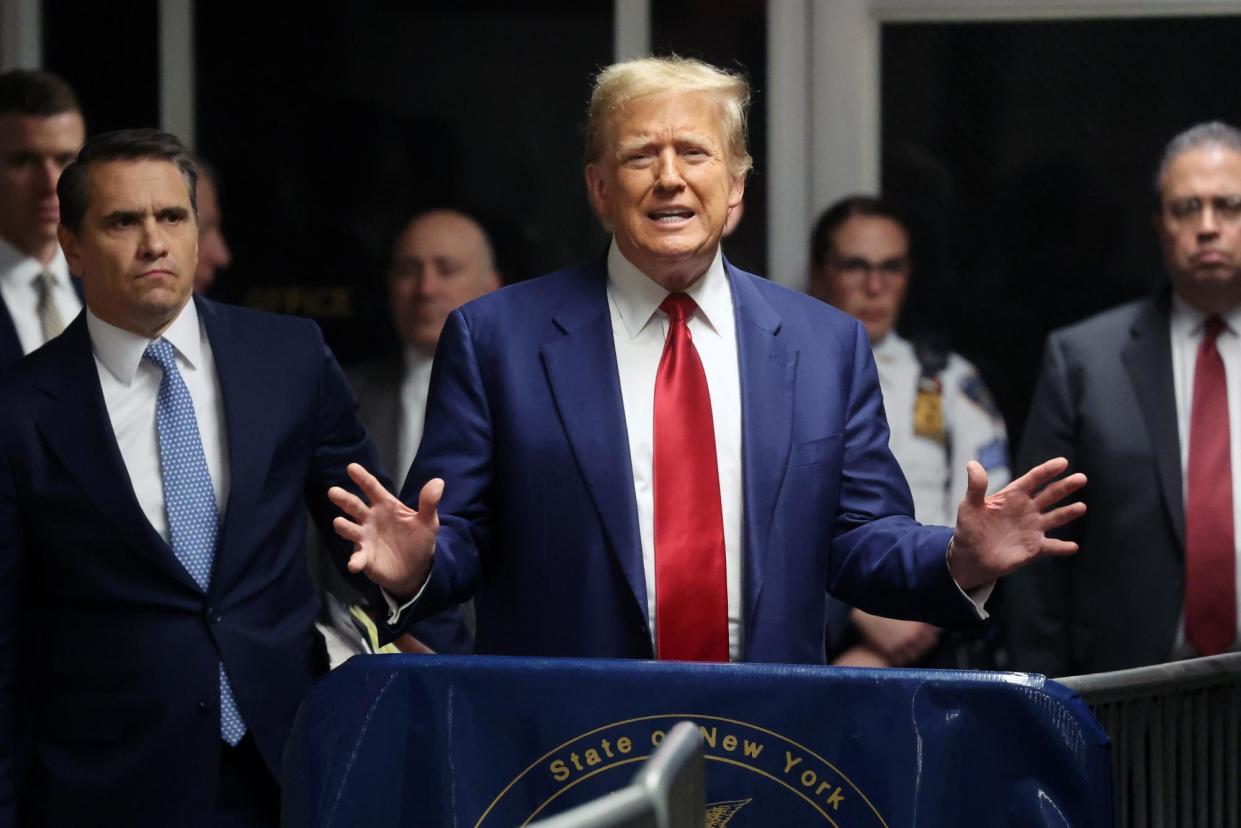Trump civil fraud case: New York court lowers bond to $175m and gives 10-day deadline

A New York court handed Donald Trump a lifeline on Monday as time ran out for the former president to secure a bond covering the $454m loss for his recent fraud case.
A panel of appellate court judges gave Trump 10 days to secure a far smaller $175m bond just hours before New York’s attorney general could legally begin the long, slow process of seizing his assets.
The reduction in the bond amount does not reduce the total $454m fine Trump will ultimately be expected to pay if an appeals court upholds the judgment. Rather, a bond works as assurance that Trump will pay the fine’s full amount if his appeal is unsuccessful. It is unclear how long the appellate court will take to issue a ruling, though it could take at least a few months.
Last week Trump’s lawyers said it was a “practical impossibility” for him to secure a bond for half a billion dollars, covering the full fine from his fraud loss.
“A bond of this size is rarely if ever seen. In the unusual circumstance that a bond of this size is issued, it is provided to the largest public companies in the world, not to individuals or privately held businesses,” his lawyers argued.
Related: Trump claims to have ‘almost $500m in cash’ despite inability to pay bond
People familiar with Trump’s finances told the New York Times the former president should be able to secure a bond to cover the smaller amount.
Along with the fine, Trump also faces a ban from running any company based in New York and obtaining loans from any banks in the state for the next three years. The appellate judges agreed to halt both bans as the court decides on the appeal.
A court-appointed monitor, who has been overseeing the Trump Organization’s financial reporting over the last few years, is expected to continue oversight of the company for another three years as part of the judgment.
If the appellate court had upheld the full fine’s amount for the bond, the attorney general’s office would have likely begun the slow process of seizing Trump’s assets without a full bond.
On Friday James’ office filed judgments in Westchester county, north of New York City, home to Trump’s sprawling Seven Springs estate and golf course. Another judgment had already been entered in New York City, home to some of Trump’s most famous assets, including Trump Tower and 40 Wall Street.
In a statement, the attorney general’s office emphasized that “the $464m judgment – plus interest – against Donald Trump and the other defendants still stands”.
“Donald Trump is still facing accountability for his staggering fraud,” the statement read. “The court has already found that he engaged in years of fraud to falsley inflate his net worth and unjustly enrich himself, his family and his organization.”
On Truth Social, Trump’s social media site, Trump once again attacked James and Arthur Engoron, the judge who oversaw the fraud case. “This is the 5th time in this case that he has been overturned, a record. His credibility, and that of Letitia James, has been shattered. We will abide by the decision of the Appellate Division, and post either a bond, equivalent securities, or cash. This also shows how ridiculous and outrageous Engoron’s original decision was at $450 Million. I DID NOTHING WRONG,” he wrote.
While Trump will likely have an easier time securing a bond for the smaller amount, it is still a hefty financial undertaking for whoever agrees to secure the bond for the former president.
Trump added a potential $3bn to his assets on Friday when his Truth Social social network finalized a long-in-the-making stock-market listing. The investment vehicle that merged with Truth Social has become a “meme stock” – an investment that has attracted a cult-like following and whose price seems out of proportion to the business fundamentals.
But that too may be a hard sell. “Meme stocks notoriously go up and down like crazy,” said Nikos Passas, a professor of criminology and criminal justice at Northeastern University. “Whoever makes a decision to deal with Trump at this point will be making a political as well as a financial decision.”


